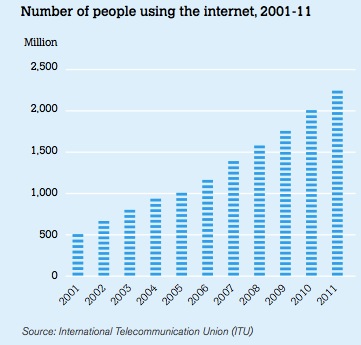E-commerce and mobile telephony have transformed the lives of many people in developing countries.
Access to the internet and mobile phones help improve the livelihood of the poor through better communications and greater access to information. Many poor farmers are now able to receive better prices for their crops because they have access to information on market prices. The African company TradeNet, a Ghana-based trading platform, is a key example.
The internet and mobile phones have also spawned a wealth of microenterprises, offering work to people with little education and few resources, such as selling airtime and repairing or refurbishing handsets.
When farmers have access to information about prices and stocks, it helps them to reduce the risk of under-selling and of either over or under-supplying their crops in a given market.
Information transmitted by mobile phone also includes access to early warning systems to mitigate the risk of losses due to extreme weather conditions or to the spread of disease.
Growth of the internet and e-commerce
There is no question that e-commerce has grown rapidly since the first users started to browse the worldwide web in search of goods and services. Today, sales realized over the internet represent a significant proportion of overall commercial sales.
- In 1991, the internet had less than 3 million users around the world and its application to e-commerce was non-existent.
- In 1999, an estimated 300 million users accessed the internet and approximately onequarter of them made purchases online from electronic commerce sites, worth approximately US$ 110 billion.
- According to the World Trade Commerce (WTC) report, this year, global business to consumer e-commerce sales are set to pass the US$ 1.25 trillion mark.
Advantages of the e-commerce for small and medium-sized enterprises
- E-commerce has been hailed by many as an opportunity for developing countries to gain a stronger foothold in the multilateral trading system. E-commerce has the ability to play an instrumental role in helping developing economies benefit more from trade. Unlike the requirements necessary to run a business from a physical building, e-commerce does not require storage space, insurance, or infrastructure investment on the part of the retailer. The only pre-requisite is a well designed web storefront to reach customers.
- E-commerce allows for higher profit margins as the cost of running a business is markedly less.
- Another advantage provided by e-commerce is that it allows for better and quicker customer service.
- In some cases, customers could have direct access to their own personal accounts online and can avoid calling companies on the phone. This can save both time and money.
Adding customer online services such as overnight package delivery services can also have commercial benefits. These can be complemented by package tracking services which allow customers to check the whereabouts of their packages online. This helps provide good levels of customer satisfaction with very little effort from the side of the business.
For further information, you may download the WTO report: E-commerce in developing countries: Opportunities for small and medium-sized enterprises





